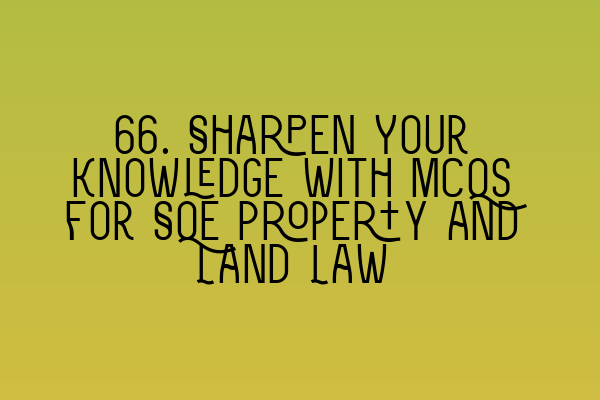66. Sharpen Your Knowledge with MCQs for SQE Property and Land Law
Are you preparing for the SQE Property Law and Land Law exams? Do you want to ensure that you have a solid understanding of the subject matter? Well, look no further! In this blog post, we will provide you with a series of multiple-choice questions (MCQs) to test your knowledge and help you sharpen your skills. So, let’s dive right in!
Question 1: Which of the following is not a freehold estate?
a) Fee simple absolute
b) Fee tail
c) Fee simple conditional
d) Leasehold
Question 2: True or False: An easement is a legal right to use another person’s land for a specific purpose.
Question 3: What is the term used to describe the transfer of ownership of property from one person to another?
a) Mortgage
b) Deed
c) Conveyancing
d) Lease
Question 4: Which of the following is a requirement for a valid contract for the sale of land?
a) It must be in writing
b) It must be signed by both parties
c) It must include the purchase price
d) All of the above
Question 5: True or False: Adverse possession is a legal concept that allows a person to acquire ownership of someone else’s land by occupying it for a certain period of time.
Question 6: What is the maximum duration of a fixed-term residential tenancy agreement?
a) 1 year
b) 3 years
c) 5 years
d) There is no maximum duration
Question 7: True or False: Restrictive covenants are legally binding obligations imposed on the owner of land to restrict the use or development of the property.
Question 8: Which of the following is not a registered title under the Land Registration Act 2002?
a) Absolute title
b) Good leasehold title
c) Possessory title
d) Qualified title
Question 9: What is the first stage in the conveyancing process?
a) Exchange of contracts
b) Completion
c) Pre-contract enquiries
d) Execution of the transfer deed
Question 10: True or False: The principle of equity encourages fairness and flexibility in property law.
Now that you have answered the MCQs, let’s evaluate your performance and review the correct answers.
Answer Key:
1) b) Fee tail
2) True
3) c) Conveyancing
4) d) All of the above
5) True
6) d) There is no maximum duration
7) True
8) b) Good leasehold title
9) c) Pre-contract enquiries
10) True
How did you do? Did you find the questions challenging? It’s important to regularly test your knowledge to identify any weak areas and focus your studying efforts accordingly. The SQE exams can be rigorous, but with consistent practice and review, you can enhance your understanding and improve your chances of success.
If you are looking for more practice materials and resources, check out our related articles that can provide further assistance and guidance:
– SQE 1 Practice Exam Questions
– SQE 1 Practice Mocks FLK1 FLK2
– SQE 2 Preparation Courses
– SQE 1 Preparation Courses
– SRA SQE Exam Dates
These resources can provide you with additional practice questions, exam tips, and comprehensive preparation for the SQE exams.
Remember, practice makes perfect! So keep honing your knowledge, understanding, and application of property and land law concepts. Good luck with your studies and journey to becoming a qualified solicitor in property law and land law!
